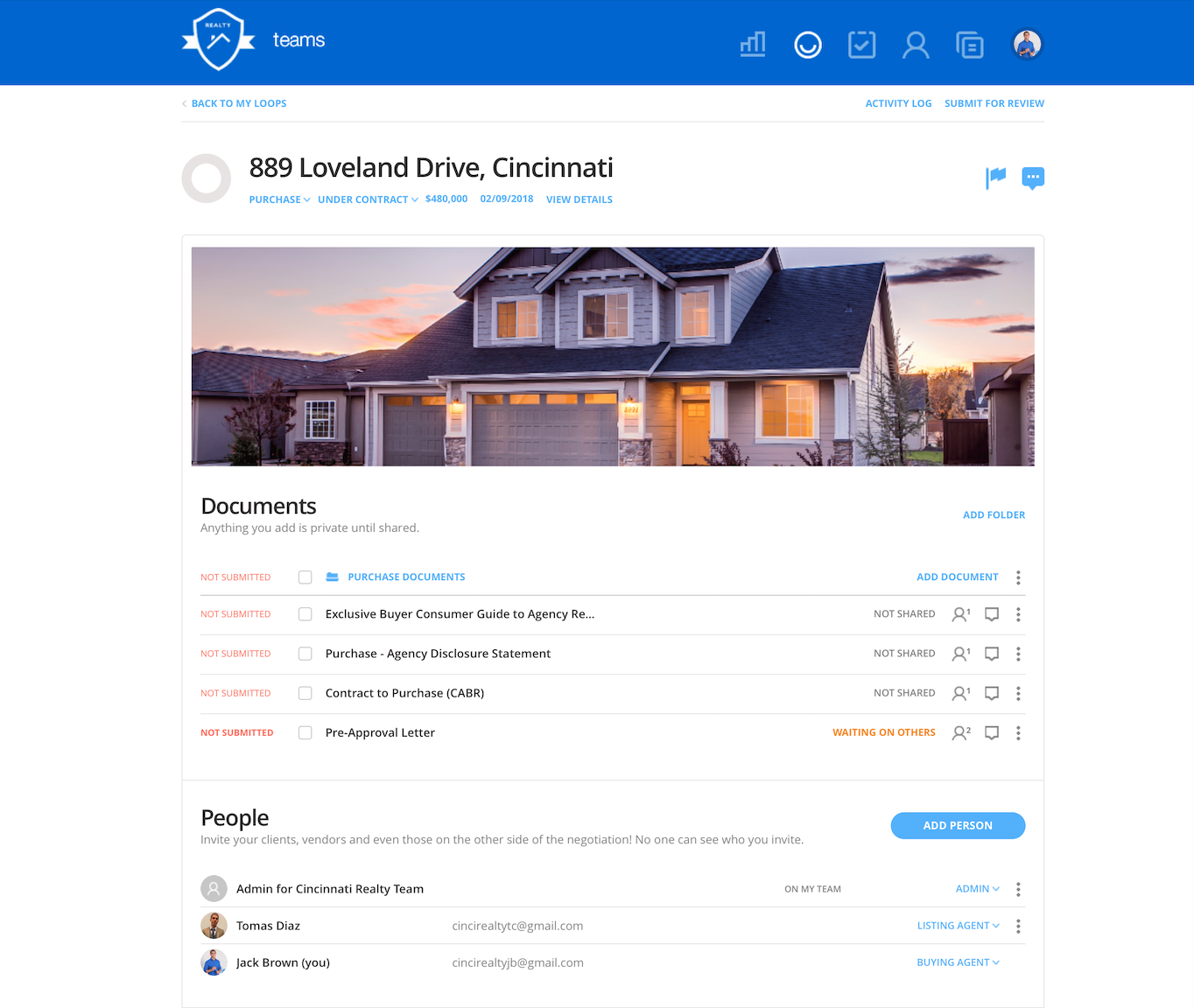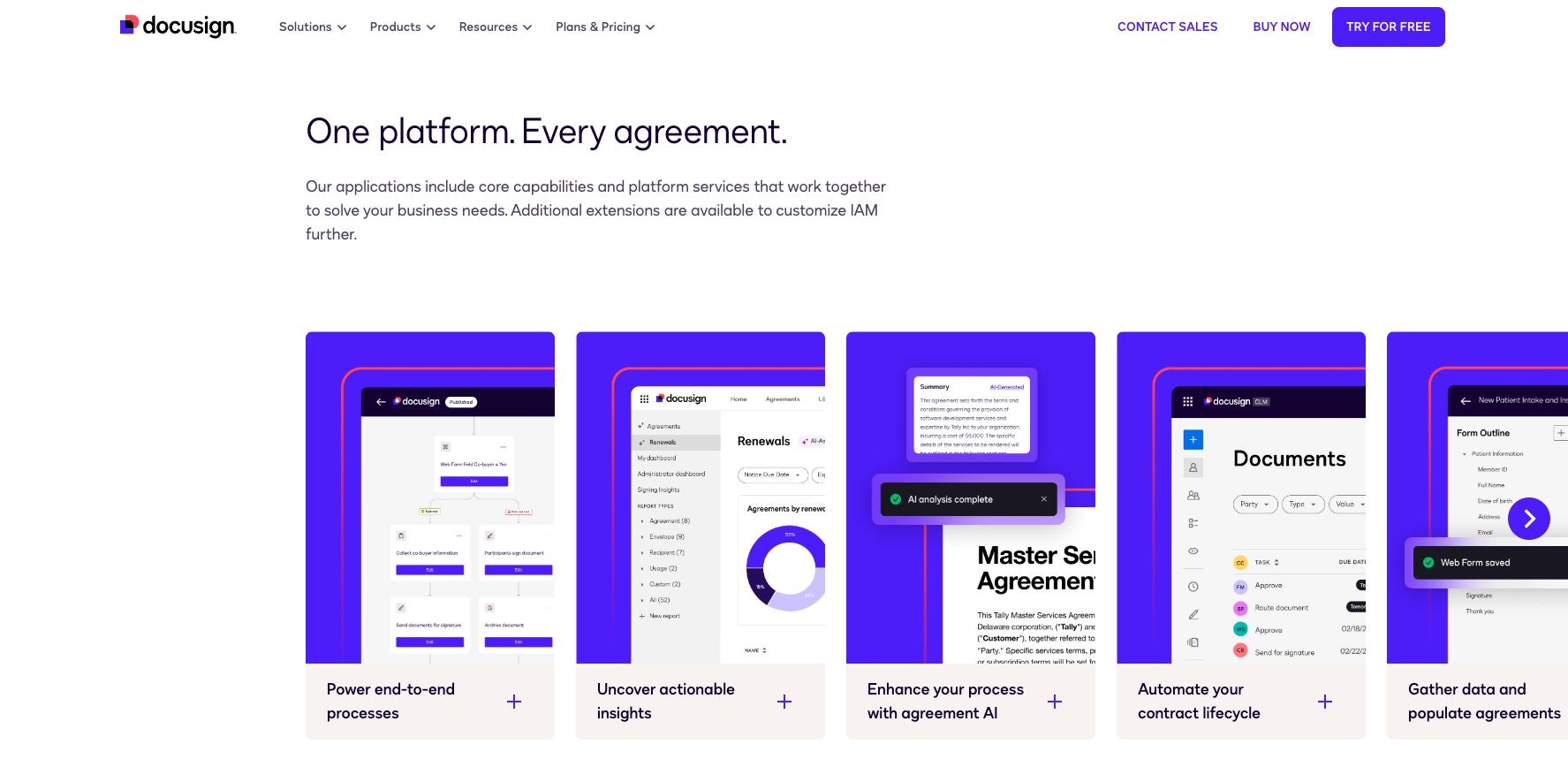If you work in real estate, you know how important a good e-signature solution is. With e-signature software like dotloop and Docusign, users can sign and share legally binding contracts, leasing agreements, and mortgage documents; meet and maintain compliance standards; and build workflows to close deals quickly and efficiently.
But which one is better? dotloop is specifically tailored to the real estate industry, but Docusign has a wider scope.
Let’s take a closer look at dotloop vs Docusign to help you find the best one for your organization.
dotloop vs Docusign: Features
dotloop is a dedicated real estate transaction management solution. You can use it to e-sign, share, and track online documents, as well as automate administrative tasks, scan documents, and expand your brand reach. You can create workflows, allow push notifications, and assign due dates to keep documents organized and all parties on the same page.
You can even use dotloop to educate or onboard your team members with online webinars, helpful articles, interactive worksheets, and private training to accelerate transactions and encourage employee development.

Docusign, on the other hand, offers features for businesses in all types of industries, including real estate. You can use it to sign and share e-signature documents, of course. But it also offers custom branding, shareable templates, collaboration tools, and workflow creation.
Docusign also prides itself on powerful security and compliance controls, thanks to a wide variety of authentication and identity verification options to keep your data safe.

dotloop vs Docusign: Integrations
Though dotloop offers a library of more than 75 integrations — from customer relationship management (CRM) systems and accounting tools to marketing solutions and payment processors — these integrations are primarily geared toward the real estate industry. So, if you’re a real estate agent or broker, you can easily use these third-party platforms to attract residential and commercial buyers and sellers, manage leads, and shorten the sales cycle. If you’re not a real estate professional, though, you’ll likely be more impressed by Docusign’s integrations.
Boasting more than 400 integrations, Docusign knows a thing or two about the importance of systems that speak to and work with each other. Docusign’s integrations with Google products, Salesforce, Smart Communications, and Stripe allow you to sign and share e-documents and agreements, streamline sales processes, create mobile-friendly forms, and complete transactions without ever leaving the platform.
dotloop vs Docusign: Pricing
Because dotloop is built for the real estate industry, its pricing models are based on specific real estate roles:
- dotloop Premium is for real estate agents ($31.99/month).
- dotloop for Teams is for real estate teams and team leaders (custom pricing).
- dotloop Business is for real estate brokers (custom pricing).
While each plan offers many of the same features — access to 75-plus integrations, unlimited transactions, and dotloop’s document editor and scanner — you only get a dedicated success manager or custom branding, for example, with dotloop for Teams or dotloop for Business.
Interestingly enough, though Docusign is designed for businesses of all backgrounds, it does offer specific pricing plans for real estate professionals. Docusign’s real estate plans include four options:
- Real Estate Starter ($10 per month)
- Docusign for Realtors ($25 per user per month)
- Real Estate ($25 per user per month)
- Enhanced Real Estate Brokerage Plans (Contact the sales team for pricing.)
These plans primarily differ in terms of how many e-signature documents you can send per month, the number of users allowed, and which integrations are included.
You can read our article on Docusigns’ pricing plans for more information about Docusign’s features and pricing plans.
dotloop vs Docusign alternative: Jotform Sign
Before you make a decision between dotloop or Docusign, consider another e-signature solution option: Jotform Sign.
Like Docusign, Jotform Sign offers e-signature capabilities for many industries, but it does boast an impressive number of real estate features. For example, of Jotform Sign’s 600-plus e-signature templates, more than 60 of them are geared toward real estate professionals — including templates for rental agreements, lease termination or extension letters, construction proposals, and owner financing contracts.
With Jotform Sign, you have access to
- A drag-and-drop builder and a host of widgets to build powerful, sharable e-signature documents
- Jotform Tables to manage all your collected data and documents
- Jotform Report Builder to generate and share insightful, data-driven reports
- A free plan (which gives you access to all 600-plus templates) and four paid plans — Bronze ($34 per month), Silver ($39 per month), Gold ($99 per month), and Enterprise (custom pricing)
- 150-plus integrations with popular CRMs, cloud storage providers, data management tools, and social media apps
Jotform Sign is fully customizable, innovative, code free, and more than equipped to handle all your real estate company’s needs — including onboarding agents, scheduling appointments, posting property listings, and performing home appraisals.
Whether you choose dotloop, Docusign, or Jotform Sign as your e-signature tool, what matters is that you’re prioritizing the needs of your team, customers, and vendors. You’re making an investment in a solution that will make their lives easier and more convenient — what’s better than that?
Photo by Karolina Grabowska



















Send Comment: